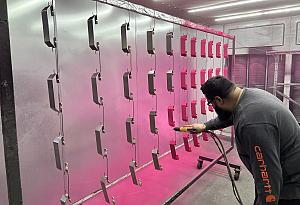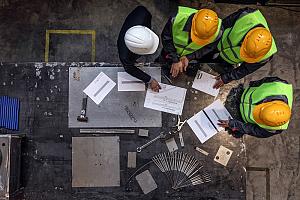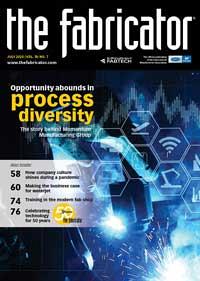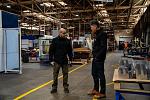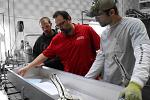Editor-in-Chief
- FMA
- The Fabricator
- FABTECH
- Canadian Metalworking
Categories
- Additive Manufacturing
- Aluminum Welding
- Arc Welding
- Assembly and Joining
- Automation and Robotics
- Bending and Forming
- Consumables
- Cutting and Weld Prep
- Electric Vehicles
- En Español
- Finishing
- Hydroforming
- Laser Cutting
- Laser Welding
- Machining
- Manufacturing Software
- Materials Handling
- Metals/Materials
- Oxyfuel Cutting
- Plasma Cutting
- Power Tools
- Punching and Other Holemaking
- Roll Forming
- Safety
- Sawing
- Shearing
- Shop Management
- Testing and Measuring
- Tube and Pipe Fabrication
- Tube and Pipe Production
- Waterjet Cutting
Industry Directory
Webcasts
Podcasts
FAB 40
Advertise
Subscribe
Account Login
Search
Company culture at METALfx shines during pandemic
Fabricator demonstrates how important a fab shop is to the community during COVID-19 crisis
- By Dan Davis
- July 31, 2020
- Article
- Shop Management
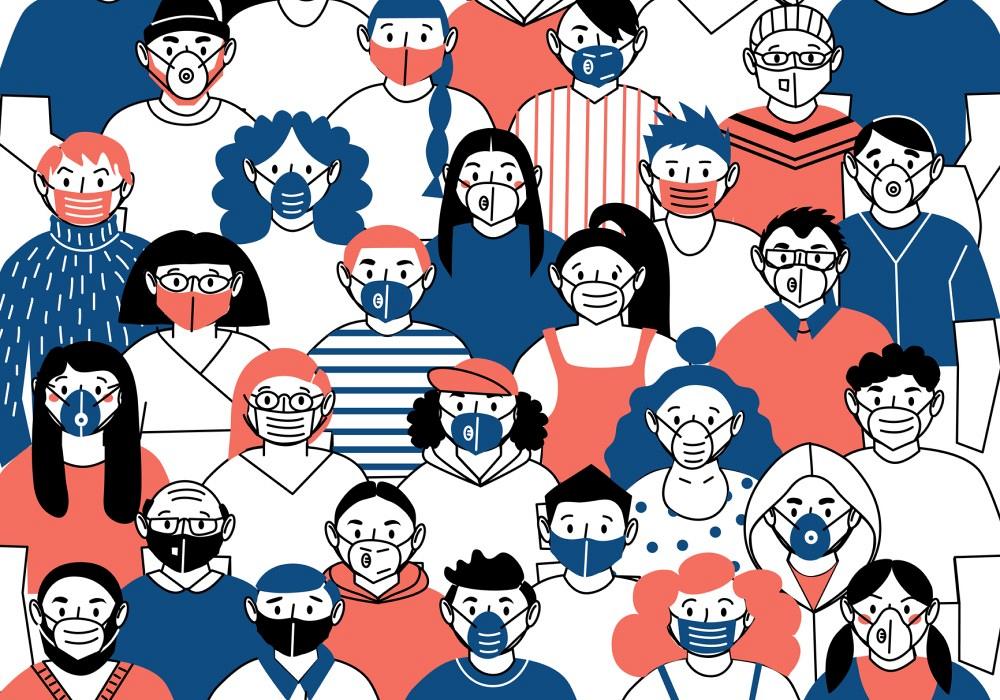
In order to help a small-town community in California, METALfx and Adventist Health Howard Memorial Hospital join forces during the COVID-19 pandemic. Getty Images
Life in Willits, Calif., is a lot like life in any remote small town in the U.S. Anyone who isn’t family is almost like family because you probably know them pretty well.
Willits, a town of around 5,000 people, sits in the center of Mendocino County, about two hours north of San Francisco. It has most of your necessities to get through life, but if you need a trip to the Costco, you are going to have to drive 20 miles south down U.S. Route 101 to the big city of Ukiah, population 16,000.
METALfx, a fab shop with 176 employees, and Adventist Health Howard Memorial Hospital stand out as the two largest employers in the area. During the COVID-19 pandemic, they also played important roles in helping out the community, and each other.
A Manufacturer in Growth Mode
Founded in 1976, METALfx has ridden the roller coaster of ups and downs of market dynamics, as have many fab shops with similar tenures. In the early 1990s the company had achieved annual revenues of $60 million and employed about 400 people. But when a major customer decided to take its manufacturing overseas around that same time, the company contracted, with many employees losing their jobs. Entire departments were gutted. In a way, the company had to start over.
Over the years METALfx has worked to avoid that scenario. Now the golden rule at the company is that no one customer can represent no more than 15% of the company’s overall revenue. That point is made clear with a display in a conference room where the company’s top 10 customers are identified. METALfx employees not only know who they are working for, but also that the company’s future is not dictated by one or two behemoth companies.
The fabricator offers its customers engineering, machining, and fabricating services, including laser cutting, punching, stamping, press brake bending, and gas metal arc and gas tungsten arc welding. It also offers assembly services, such as kitting and subassembly builds. The paint and powder coating line, complete with a multistage pretreatment line, also has proven popular with customers looking for a one-stop shop to provide a formed and finished part, according to Connie Bates, METALfx’s director of business development and marketing.
These services and other value-added offerings, such as just-in-time delivery and design for manufacturing work, have helped to build the fabricator’s portfolio of customers in recent years, Bates said. The company enjoyed annual growth of 13% both in 2018 and 2019.
The growth has come with many longtime customers, some dating back 25 years, and new ones. METALfx landed a huge customer in the transportation field several months ago, and it has since grown to be one of its largest accounts.
“We had one month where we had 55 new parts dropped on us,” Bates said. METALfx stumbled a bit as it tried to process all of the new work, but the customer expected some delayed responses, acknowledging that it was throwing a lot of work at the fab shop at one time, Bates added.
In the early spring of 2020, the fabricator installed a new Bystronic BySmart 6-kW fiber laser cutting machine that is attached to an automated storage and retrieval tower and a ByTrans Cross material handling system that keeps up with the high process speeds of the fiber laser. Bates said the new laser will help the company meet customers’ shorter lead times, cutting up to five times faster than the 4-kW CO2 laser cutting machine, and produce parts with cleaner edges. (The fiber laser ultimately will replace two of the company’s three CO2 laser cutting machines. One will be kept for a prototype/quick turnaround cell.) The laser cutting machine’s limited energy usage also is a good fit for the company, she added, because the area’s electricity provider, Pacific Gas & Energy, is very much interested in reducing the demand on its grid, particularly in times of natural disasters like last year’s nearby forest fires.
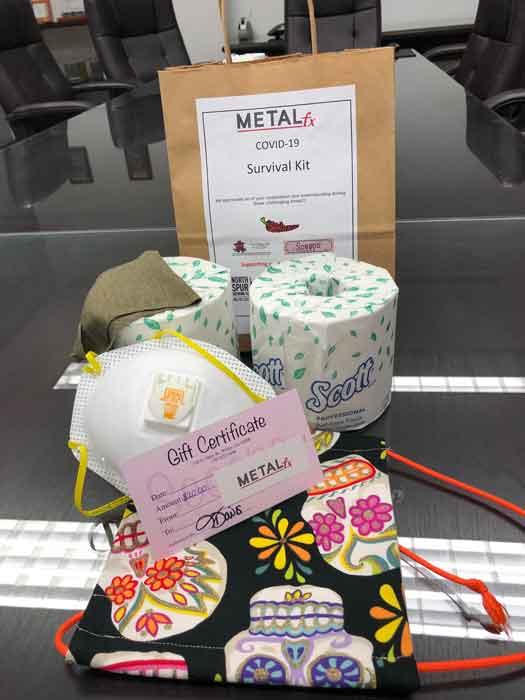
METALfx management handed out COVID-19 survival kits to employees in May as thanks for coming to work and as a way to support local businesses. In each COVID-19 survival kit, recipients found masks, cleaning cloths, and a gift certificate to a local restaurant.
METALfx enjoyed a lot of positive momentum as this year began, pacing at about 12% growth when compared to the same period in 2019. But that came to a halt later in March as shelter-in-place orders began in response to the COVID-19 crisis. Business wouldn’t be the same, but it wasn’t going to stop.
A Manufacturer in Protection Mode
As California came to grips with responding to the coronavirus outbreak in March, METALfx was in the midst of trying to figure out how it would proceed. Once talk began of shelter-in-place orders for counties in Northern California, one of METALfx’s top customers contacted it saying that the fabricator was essential to its business. The customer is a manufacturer of medical testing equipment, with some of its product being used in the battle against the coronavirus. Bates added that in the ensuing days, another customer contacted the shop about its own products being vital as well. METALfx wouldn’t be shutting down during this pandemic.
“We were trying to figure out how we were supposed to do it,” said Henry Moss, METALfx’s president. “I looked on Amazon, and I couldn’t find a book on how to run a company during a pandemic. It hasn’t been written yet.”
In an effort to make the right decisions that would protect employees and enable the company to meet its supply chain obligations, Moss reached out to connections at nearby Adventist Health Howard Memorial. (The hospital was built in 1927 with financial help from Charles S. Howard, a prominent auto dealer of the time and eventual owner of the famed racehorse Seabiscuit. The foundation is named after Howard’s son Frank R. Howard, who died in an auto accident.) The hospital responded quickly, and METALfx management met with two of the hospital’s medical leaders to learn what they were doing to keep their own staff safe and healthy during this time.
The fabricator took what the hospital was doing and scaled it back for the shop.
Employee temperatures were checked before they entered the facility to see if they might have a fever. They also were asked each day if they were exhibiting any symptoms associated with the coronavirus. Social distancing efforts were put in place. Also, employees who fit the medical profile of someone whose life might be threatened if they contracted the coronavirus were instructed to stay home. Moss said that most of the protective steps took place a couple of weeks before formal guidance became available from federal and state authorities.
With the closing of school buildings and instruction moving to the virtual world, parents suddenly had to worry about child care during the day. Bates said that the company facilitated shift changes for those employees who needed to be home during the day while virtual school was in session.
In a move that would please any lean manufacturing practitioner, METALfx applied a visual indicator tool to its COVID-19 prevention program. When employees make it past the temperature checkpoint and the question-and-answer stage of entry, they receive a colorful circular sticker that goes on an easy-to-see badge. If it’s a blue sticker day and the employee checks out to be fever- and symptom-free, he or she gets the blue sticker.
“If it’s a blue day and the manager sees somebody with a yellow sticker, that manager needs to go get that person,” Bates said.
Around this time, METALfx had the opportunity to return the favor to their colleagues at the hospital. As news of the coronavirus spread and people recognized shortages of proper personal protective equipment (PPE) for their front-line medical workers, METALfx management recognized that they had ample N95 masks in inventory, primarily for use by those responsible for deburring parts. Bates said that they decided to contact hospital administrators to offer them the N95 masks. The hospital welcomed the PPE and gave the metal fabricator some of its inventory of surgical masks, the disposable blue-and-white masks that are now a common sight in indoor environments.
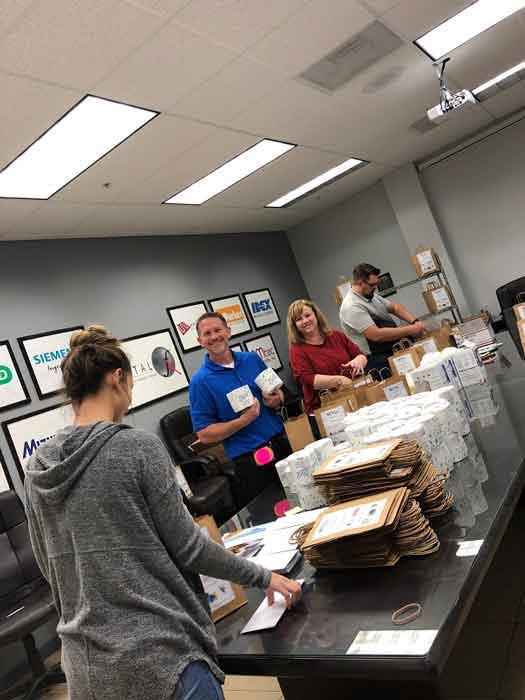
METALfx President Henry Moss holds up two toilet paper rolls as a team helps to assemble 170 COVID-19 survival kits.
METALfx also learned of an opportunity to help out the Frank R. Howard Foundation, a nonprofit organization dedicated to supporting the hospital’s stability and growth and serving the Willits community. The foundation was coordinating the distribution of thousands of cloth masks, which had been made by local seamstresses and hobbyists, to the community. The masks, however, didn’t have the metal nose guards that provided a tight fit around the nose, allowing the mask to stay in place more easily and make it more effective as a shield against sharing coronavirus droplets or breathing them in.
People associated with the mask distribution effort were trying to manually form these metal nose guards, but obviously that wasn’t very efficient. Moss said someone recommended METALfx as a resource to figure out a better way to create these small metal pieces, so a team was put together to look at it. As it turns out, the company had a punch tool that produced an oblong shape that was almost the exact shape that was needed, and it had aluminum on hand to make the nosepieces. With the help of one of its Amada Vipros turret punching machines, METALfx produced 9,000 nosepieces in one afternoon.
“You can go in any store here in town now, and they’re available for anybody who wants them,” Moss said.
So as all of this was going on, METALfx was still producing parts for its key clients. Bates said that people were a little anxious about working during this time because of the media coverage of the pandemic and the general lack of knowledge about the virus and its effects.
And then there was the run on toilet paper that wiped most store shelves clean. “The whole thing just cracked me up,” Moss said.
The company checked with its supplier of industrial goods, and it could still deliver toilet paper. As a result, Moss thought it might be fun to share the much-sought-after paper goods with his hard-working teammates.
But also around this time, people were pushing local Willits residents to support the town’s businesses. With a shelter-in-place order in effect, people were not spending money at local stores and restaurants.
And on May 1 Mendocino County issued a public order requiring residents to wear a mask in certain public interactions.
All of those elements led the METALfx management team to create a COVID-19 survival kit for their employees. It contained two rolls of toilet paper; three masks (an N95 respirator, a cloth mask, and a double-cloth mask that can accommodate a filter); and a gift certificate to a Willits restaurant.
“It was all meant to be lighthearted,” Moss said. “When we gave out the kits, we couldn’t have a big meeting, so we went around and handed these things out. When I pulled the toilet paper out in every group, it got a laugh and lightened the mood for everyone.”
A Manufacturer Looking Forward
No one knows what the future holds, but most manufacturers are preparing for their customers to get back to production and ramping up orders for parts. METALfx is no different.
Moss said moves like reorganizing the assembly department, doubling the capacity of the powder coating line, and adding the new laser cutting machine have placed it in a good position to respond to the manufacturing rebound. Future moves addressing the deburring bottleneck and rearranging other equipment to allow for a more organized flow of parts will help as well.
“We have caught up and pushed a lot of our backlog through,” Moss said. “We’re sitting primed and ready for the new opportunities that come along.”
The small-town company has big plans for the future. That’s good news for METALfx employees and the townfolk of Willits.
About the Author

Dan Davis
2135 Point Blvd.
Elgin, IL 60123
815-227-8281
Dan Davis is editor-in-chief of The Fabricator, the industry's most widely circulated metal fabricating magazine, and its sister publications, The Tube & Pipe Journal and The Welder. He has been with the publications since April 2002.
subscribe now

The Fabricator is North America's leading magazine for the metal forming and fabricating industry. The magazine delivers the news, technical articles, and case histories that enable fabricators to do their jobs more efficiently. The Fabricator has served the industry since 1970.
start your free subscription- Stay connected from anywhere

Easily access valuable industry resources now with full access to the digital edition of The Fabricator.

Easily access valuable industry resources now with full access to the digital edition of The Welder.

Easily access valuable industry resources now with full access to the digital edition of The Tube and Pipe Journal.
- Podcasting
- Podcast:
- The Fabricator Podcast
- Published:
- 04/16/2024
- Running Time:
- 63:29
In this episode of The Fabricator Podcast, Caleb Chamberlain, co-founder and CEO of OSH Cut, discusses his company’s...
- Industry Events
16th Annual Safety Conference
- April 30 - May 1, 2024
- Elgin,
Pipe and Tube Conference
- May 21 - 22, 2024
- Omaha, NE
World-Class Roll Forming Workshop
- June 5 - 6, 2024
- Louisville, KY
Advanced Laser Application Workshop
- June 25 - 27, 2024
- Novi, MI



